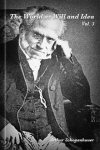The World as Will and Idea (3 vols.)
Digital Logos Edition
This product has been transferred from Community Pricing to Pre-Pub. The actual funding level may be lower than it appears, which could delay production. The amount of funding still needed will be evaluated and updated soon.
Overview
These three volumes of The World as Will and Idea represent the seminal work of influential German philosopher Arthur Schopenhauer. Explaining his philosophy that “the world is my representation,” Schopenhauer argues that individuals are motivated by pleasure, and that happiness and satisfaction are unattainable, making aesthetic contemplation the more prudent course. Heavily influenced by Immanuel Kant, Schopenhauer wrote a famous critique of Kantian philosophy, included in volume 2. With several known variations to the title, these volumes are presented as The World as Will and Idea, translated from German by R. B. Haldane and John Kemp.
With Logos Bible Software, these valuable volumes are enhanced by cutting-edge research tools. Important terms link to dictionaries, encyclopedias, and a wealth of other resources in your digital library. Powerful topical searches help you find exactly what you’re looking for. Tablet and mobile apps let you take the discussion with you. With Logos Bible Software, the most efficient and comprehensive research tools are in one place, so you get the most out of your study.
- Schopenhauer’s philosophy of the “will”
- Supplemental texts to each of the books
- A critique of Kantian philosophy
- Title: The World as Will and Idea
- Author: Arthur Schopenhauer
- Translators: R. B. Haldane and John Kemp
- Publisher: Kegan Paul, Trench, Trübner & Co.
- Volumes: 3
- Pages: 1,545

This volume contains Schopenhauer’s original works on the philosophy of the will. The text includes The Idea Subordinated to the Principle of Sufficient Reason, The Objectification of the Will, The Idea Independent of the Principle of Sufficient Reason, and The Assertion and Denial of the Will to Live, When Self-Consciousness has been Attained.

This volume includes the Schopenhauer’s criticism of the Kantian philosophy, as well as supplements to the first and second books of The Idea Subordinated to the Principle of Sufficient Reason and The Objectification of the Will.

This volume includes additional supplements to The Objectification of the Will, as well as supplements to The Idea Independent of the Principle of Sufficient Reason and The Assertion and Denial of the Will to Live, When Self-Consciousness has been Attained.